
A S S OCIATION OFSOUTH AUSTRALIA
“He was bleeding profusely as he was on blood thinners. It initially appeared that both legs had been severed.” CRUSHED!










A S S OCIATION OFSOUTH AUSTRALIA
“He was bleeding profusely as he was on blood thinners. It initially appeared that both legs had been severed.” CRUSHED!








The Police Association Members Buying Guide offers members and their families massive exclusive discounts on a wide range of goods and services.

The easiest way to access all the discount codes is to join the private Facebook Group at facebook.com/groups/ membersBuyingGuide
Or access the codes by logging on to the Police Association website (pasa.asn.au) and navigating to the Member Services tab.

It’s easy to imagine someone getting crushed under a pile of rubble in a building collapse or in a car crash But who would ever envision a worker with serious crush injuries to his lower body as he lay pinned under a two-ton safe?
He and his colleagues had a plan to move two safes into alternative positions at Southern Exhibit Property. It started well but ended with the second safe toppling off a forklift. Senior Constable Jim McCluskey was right in its path. His injuries were life-threatening.
He remembers nothing of the accident and has never watched the CCTV footage His wife, retired senior constable Vivien Muller, relives her fraught response And both she and Jim tell of the trauma associated with his fight to survive and recover
Neither Premier Peter Malinsauskas nor Opposition leader David Speirs hesitated when it came to the opportunity to speak to the Police Journal They had occupied their roles for five months and three months respectively when they sat down to talk
Each spoke of his background and influences and, most important, his perception of policing But both also responded to specific questions on police issues, like the DPM and Commissioner Grant Stevens’ 50-50 gender recruitment policy.
Police Association deputy president Wade Burn argues that all police promotional positions, up to and including the rank of chief superintendent, should be open to appeal and independent review
Police Association president Mark Carroll analyses the Police Disciplinary Tribunal and explains its value in the broader discipline system
 Brett Williams brettwilliams@pj asn au
Brett Williams brettwilliams@pj asn au
Publisher: Police Association of South Australia Level 2, 27 Carrington St, Adelaide SA 5000 T (08) 8212 3055 F (08) 8212 2002 www.pasa.asn.au Editor: Brett Williams (08) 8212 3055 Design: Sam Kleidon 0417 839 300 Advertising: Police Association of South Australia (08) 8212 3055 Printing: Finsbury Green (08) 8234 8000
The Police Journal is published by the Police Association of South Australia, 27 Carrington St, Adelaide, SA 5000, (ABN 73 802 822 770). Contents of the Police Journal are subject to copyright. Reproduction in whole or in part without written permission of the Police Association of South Australia is prohibited. Opinions expressed are not necessarily those of the editor. The Police Association accepts no responsibility for statements made by advertisers. Editorial contributions should be sent to the editor (brettwilliams@pj.asn.au).
Police Association 6 President 10 Right discipline process already in place Industrial 26 Parliamentary inquiry to hear Police Association view Much to resolve Health 29 Foreign accent syndrome legitimate? Motoring 30 MX-30 Electric 300-Series LandCruiser Books 34 Cinema 36 Wine 39
The Last Shift 40 Jobs you never forget 46
12 Crushed!
It was all going so well until it came to the attempt to lower that second safe into position at Southern Exhibit Property
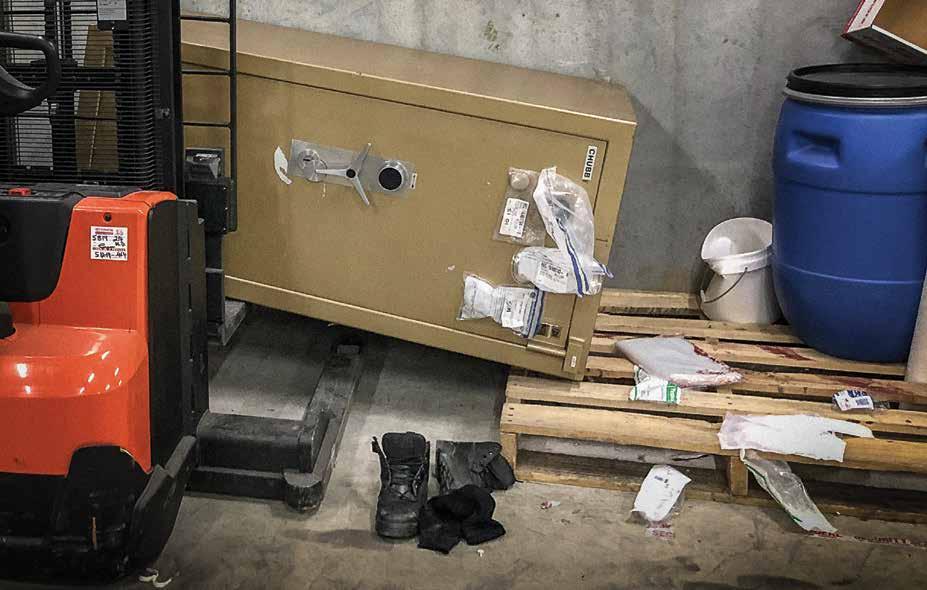
When it comes to critical police issues, just how divergent are the views of Premier Peter Malinauskas and Opposition leader David Speirs?

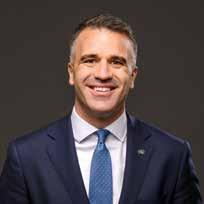




 Mark Carroll Andrew Heffernan Member Liaison Officer
Steven Whetton Assistant Secretary
Nadia Goslino Member Liaison Officer
INDUSTRIALPRESIDENT
Brett Williams Editor Nicholas Damiani
POLICE JOURNAL MEDIA AND COMMUNICATIONS
Samanda Brain
Mark Carroll Andrew Heffernan Member Liaison Officer
Steven Whetton Assistant Secretary
Nadia Goslino Member Liaison Officer
INDUSTRIALPRESIDENT
Brett Williams Editor Nicholas Damiani
POLICE JOURNAL MEDIA AND COMMUNICATIONS
Samanda Brain
Superannuation Mark Carroll and Michael Kent
Police Dependants Fund Bernadette Zimmermann
Leave Bank Andrew Heffernan
Country housing Andrew Heffernan
Commissioner’s Office Health Safety & Welfare Advisory Committee Steven Whetton
Legacy Julian Snowden
Sexual Orientation, Gender Identity & Intersex members Nadia Goslino and Andrew Heffernan
Metro North Branch
Elizabeth Nick Sipovac
Gawler Andrew Wearn
Golden Grove Darren Quirk
Henley Beach Sean Hobbs
Holden Hill Cameron Scott
Northern Prosecution Tim Pfeiffer
Parks Matthew Sampson
Salisbury Stuart Smith
Country North Branch
Ceduna Anthony Taylor
Coober Pedy Clinton McClure
Kadina Gavin Moore
Nuriootpa Andrew Dredge
Peterborough Nathan Paskett
Port Augusta Peter Hore
Port Lincoln Mark Heading
Port Pirie Gavin Mildrum
Whyalla Paul Velthuizen
Crime Command Branch
Adelaide Alex Grimaldi
Elizabeth Joel Manson
Forensic Services Kristin Enman
Fraud Sam Agostino
Intel Support Robert Alderson
Major Crime Alex McLean
Major Crime Phil Buttfield
Port Adelaide Scott Mitchell
Metro South Branch
Hindley Street Dick Hern Netley Paul Clark Norwood Jason Griffin
Southern Prosecution Sallie McArdell
Southern Traffic Joshua O’Dwyer Sturt David Handberg
Country South Branch
Adelaide Hills Joe McDonald Berri John Gardner Millicent Tanya Payne
Mount Gambier Robert Martin Murray Bridge Aaron Galwey Naracoorte Michael Hutchinson Renmark James Bentley South Coast Andrew Bradley
Operations Support Branch
Dog Ops Bryan Whitehorn (chair) Academy Melanie Smith ACB
Tony Boots
Band Adam Buckley
ComCen Vilija Sabeckis
ComCen Glenys Moriarty
Human Resources Eugene Wasilenia
Mounted Ops Sonia Wellings
STAR Andrew Suter
State Tac/Op Mandrake Duncan Gerrie Traffic David Kuchenmeister
Officers Branch Les Buckley
Women’s Branch Kayt Howe (chair) (no delegates)

The Police Disciplinary Tribunal is a key pillar of justice for police, and it must stay if South Australia is to remain the nation’s pacesetter in law enforcement.
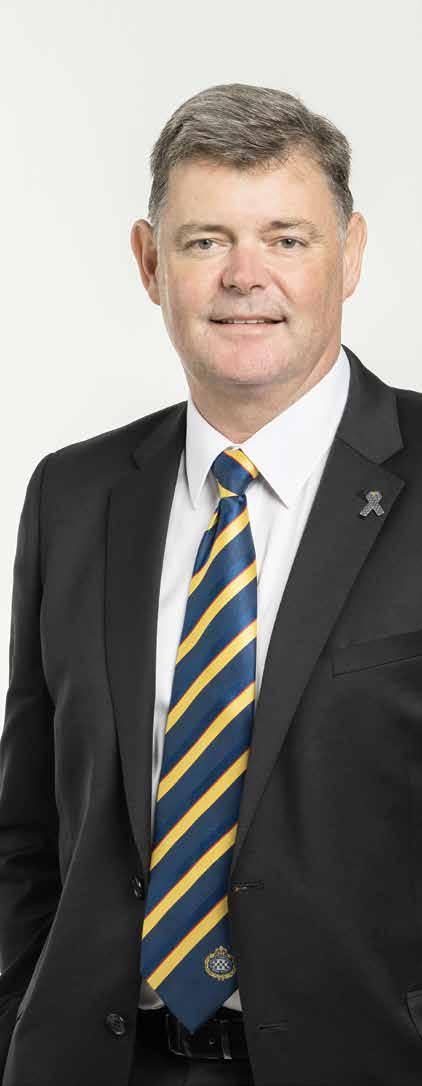
In late October, I will front the Crime and Public Integrity Committee to present this very case as part of a parliamentary review of the Police Complaints and Discipline Act
I addressed this same committee as recently as mid-2020
In fact, since the introduction of the SA ICAC, I have participated in several reviews about the legislative schemes of integrity in SA, including issues around the police complaints system
No organization is more experienced than the Police Association when it comes to understanding this system. We have had key involvement in every single previous review.
We have presented many sound legal arguments to improve the system
SA has largely avoided the common complaints in other police jurisdictions about a lack of procedural fairness and transparency.
One such argument was our 2020 submission to Judge Barrett KC, which was summarily dismissed in favour of the ICAC’s recommendations
Recommendations which were, in fact, compiled before the legislative requirement to review the act.
Back then, now former ICAC commissioner Bruce Lander indicated that parliament should just go ahead and adopt those recommendations without question
That was an extraordinary — and, frankly, dangerous — position
The association also issued warnings much earlier than this — as far back as 2014, in fact
Back then, the same old voices were calling for the dismantling of the PDT.
It was during a detailed review of the police ombudsman function that I highlighted a fact lost on so many of these voices: SA has largely avoided the common complaints in other police jurisdictions about a lack of procedural fairness and transparency
The PDT is, essentially, an employment tribunal, which deals independently with internal police discipline issues
The confidential nature of the proceedings prevents the name-andshame nature of public examinations where individuals can be publicly vilified.
We’ve seen, in other parts of the world, how quickly police services can deteriorate when police officers are not afforded an evidence-based disciplinary system
The destruction of the reputations of innocent police officers is a fast track to an uncivilized, unsafe society It doesn’t expose “bad cops” On the contrary, it demeans the sworn office and demoralizes police officers.
And, long-term, it compromises the very high quality of candidate who is attracted to the police profession in the first place
When a police officer faces significant penalties –including termination — the assurance of a fair evidentiary hearing, before a properly specialized independent magistrate, is a necessity.
When a police officer faces significant penalties – including termination — the assurance of a fair evidentiary hearing, before a properly specialized independent magistrate, is a necessity.
It is critical to a fully functional police force now and into the future.
Why on earth would SA want to drop its standards to “align” itself with other jurisdictions?
Those jurisdictions should, in fact, be lifting their standards to match the SA system
Another significant factor: the vast majority of police officers has faith in the PDT That faith is fundamental to carrying out their duties
And history shows the PDT has never been fundamentally unwieldy, inefficient, expensive or inconsistent in its processes and outcomes.
Police officers who make serious mistakes can be disciplined, suspended or terminated — and they often are So, there is no suggestion that the present processes do not work or are overly favourable to cops
But there’s a point which can’t be made strongly enough: it is entirely in the public interest for police officers to discharge their critical duty with confidence in the system and its disciplinary body.
Otherwise, why would a cop put his or her body and life on the line?
The PDT delivers confidence in the disciplinary system It determines the facts, deals in evidence rather than speculation, and retains independence and transparency
We already know that thousands of spurious complaints against police officers are made each year It’s obvious that a public airing of these complaints would unduly and unfairly prejudice police officers’ reputations
There is also one other unique aspect of police disciplinary hearings: unlike members of the public, police officers have no right to silence . They are compelled to answer questions
Imagine if, in addition to that, cops had to endure relentless public exposure and everything which results from the modern version of that phenomenon.
Cops and their families and, indeed, the individual complainants, would be sitting ducks for social media trolls and other haters
Under the current system, the Office for Public Integrity acts as a live check and balance of the investigation process, reassuring the public that there is independent oversight
That is the purpose of the OPI under the Police Complaints and Discipline Act
Police officers are not above the law. They never have been. In the most serious cases — those in which police officers face criminal proceedings — the media freely report on the process and the outcome
And we have never taken issue with that
On the day of the arrests in the Sturt Mantle matter, the ICAC and others held a press conference and excoriated the accused police officers
The problem was, they were wrong
All those officers have now been either acquitted or had the cases against them dropped.
I make no criticism of the former ICAC or the law which allows media coverage of criminal charges against police officers
But it does serve to illustrate a fundamental point: top brass don’t always get it right
Just imagine if this sort of media coverage was allowed for every single case which appeared before the PDT?
It would have disastrous consequences for both serving police officers and South Australia’s ability to recruit the best individuals in the future.
Stuck under two tons of iron with both his legs broken, Jim McCluskey might easily have died. And it was the kind of workplace injury which just never seemed likely.
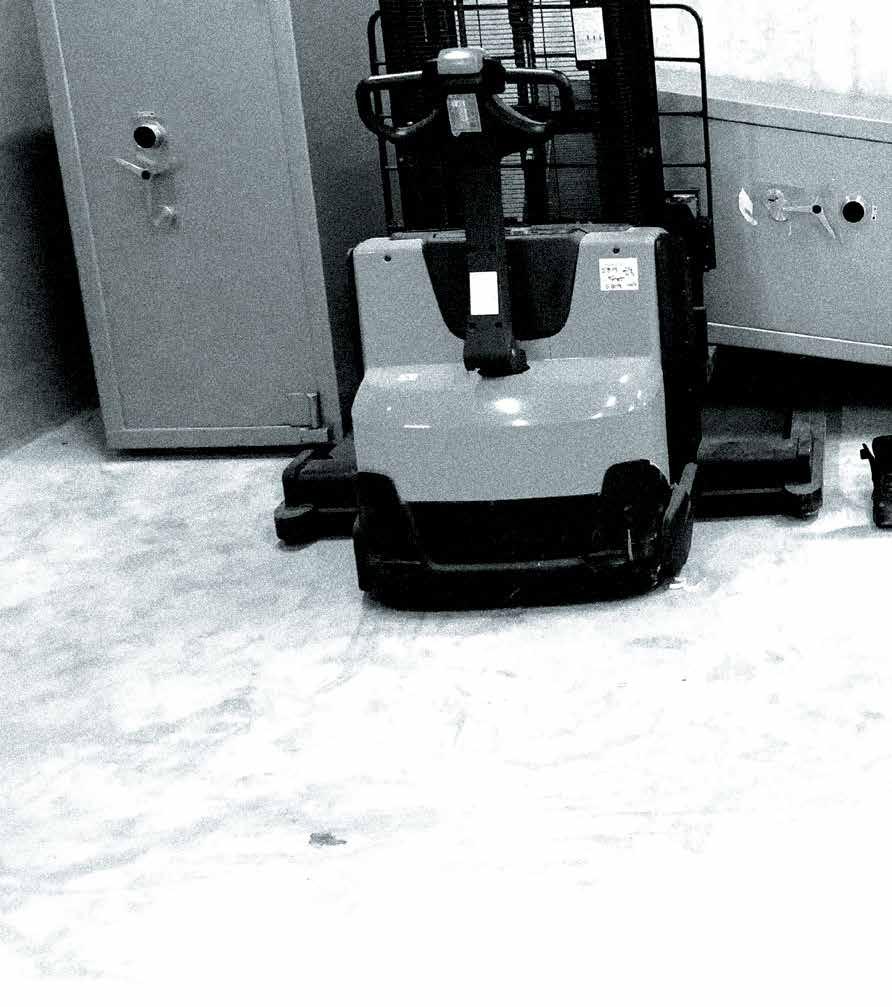
Bad luck had plagued Senior Constable Jim McCluskey whenever it came to accidents He never had the good fortune of others, like Formula One drivers who emerge injury-free after their cars flip and burst into flames
Once a passenger in a car which slammed into an Adelaide Stobie pole, he suffered broken ribs and struggled to breathe until paramedics arrived.
Even in the US he became the victim of a serious crash in the mid-1990s Hit by a

four-wheel-drive vehicle as he was out cycling one day, McCluskey wound up with his leg “smashed”
As a cyclist, he came off his bike many times, broke bones, and underwent major operations And he commonly suffered, but survived, injuries in his youth when he took part in extreme sports like drag racing.
But, in 2020, he lay unconscious on a concrete floor with his legs crushed under an old two-ton bank safe at
Southern Exhibit Property The safe had toppled off a forklift And this last episode of bad luck was the worst, as McCluskey was no certainty to survive
The safe was one of two which he and his colleagues had intended to reposition Each iron structure, in the only airconditioned room in the Edwardstown building, was taking up desperately needed space for DNA exhibits.
“DNA’s coming in all the time,” McCluskey says “There was no reason for two safes to be in an air-conditioned room They’ve only got money, gold, valuables, watches, and things like that in them
“There would’ve been a huge amount of room with the safes gone I would’ve estimated (room for) another two years’ worth of DNA coming in ”
Frustrating to Southern Exhibit Property staff was the constant lack of funding for any measures to create space.
“So, we got together,” McCluskey says, “did a risk assessment, and had a little handcontrolled, walk-behind forklift And we
didn’t have very far to go to move these safes
“I decided we would move them from the air-conditioned room and down the corridor, probably 30 metres away Put them in the drug room Simple ”
So, McCluskey, and one of his colleagues operating the forklift, got the move underway. And, once in the drug room, it was critical to lower the first safe with as much exactness as possible into its new position.

Were safes as heavy as these to end up any distance out of place, it would be an agonizing task to manoeuvre them again McCluskey, knowing precisely where this first safe had to go, guided the forklift operator
“More,” he indicated, “a little more,” until the safe was hard up against a solid concrete wall The forklift operator then lowered it to the ground without a hitch, and McCluskey exclaimed: “lovely job”.
His next words, as he delighted in the successful repositioning of safe No. 1, were “let’s go get the second one”. And that was, and remains, all that McCluskey remembers of that April afternoon
“I woke up in hospital,” he says. “I don’t remember going back to get the second one (safe). But what I’ve been told is we went back and did virtually the same thing ”
And only from what others have told him did McCluskey ever get the story of the closest call of his life As he knows now, he undertook the same steps as he had with the first safe This time, however, safe No 2 toppled off the forklift tines directly toward him
“And apparently,” he says, “I jumped out of the way. But there was a pallet or something there and I didn’t get out of the way quickly enough. And the safe got me (pinned) from both knees down ”
So, there was McCluskey, trapped under the monstrous size and weight of the safe with a compound fracture of his right tibia Indeed, the broken bone had pierced through his skin and was sticking clean out of his leg
A break to his left tibia was slightly less dramatic to the eye as the bone had not likewise pierced its way out of his leg.
What McCluskey never knew about the accident, his wife soon did know. Recently retired senior constable Vivien Muller had herself worked at Southern Exhibit Property for a few weeks not long before the accident
“The room that the safe fell in is like a concrete bunker,” she says “The noise of the safe falling was apparently earth-shattering and Jim’s shouts of pain reverberated around the building
“He was bleeding profusely as he was on blood thinners. It initially appeared that both legs had been severed.
“The safe had landed with a small portion resting on the tines, so several members were able to stand on them and take some of the weight off Jim’s legs
“(Colleague) Keith Delongville quickly fetched the larger forklift and had to manoeuvre and lift the safe without dropping it back onto Jim
“The property officers and other members responded so quickly They were on the phone immediately to ambos and ComCen and manned the gates to guide in the emergency services. ”
1. The forklift and safe at the scene of the accident.
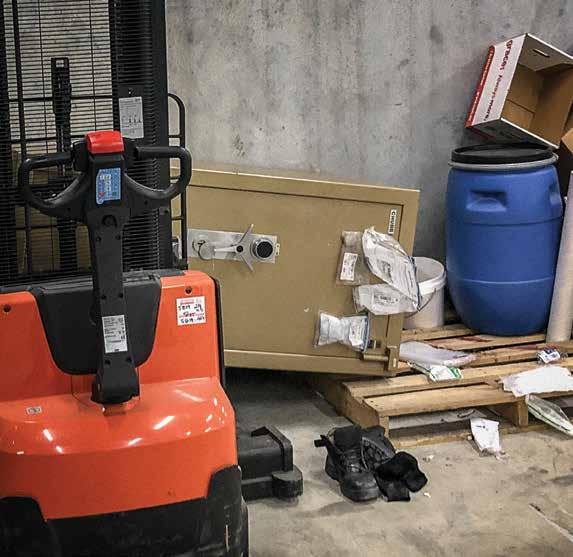
2. Sergeant Rod Parsons and Senior Constable Rick Jones visit McCluskey in hospital.
3-4. X-rays showing screws and plates in McCluskey’s legs.
But Muller had known nothing of the accident, or her husband’s critical condition, until she got a phone call from Delongville When his call came, she was relaxing on her lounge, and rightly given that she was recovering from surgery.
Muller still remembers Delongville telling her that McCluskey had had an accident at work and that an ambulance was on the scene The specifics of the accident did not then come under discussion but, naturally, Muller wanted to go to her husband
So, after the Delongville call, she contacted her son, Rowan He picked her up and the two immediately set out for the warehouse By the time they pulled up at the back gates, Muller still had no idea of the extent and seriousness of her husband’s injuries.
“At those back gates, it was like a corridor of police officers,” she recalls. “They sort of parted and it was silent
Absolutely silent The ambulance was there and I just had that sinking feeling
“(Sergeant) Rod Parsons walked out and just took me by the hand and walked me in there When we got to the room, it was just bedlam. There were people everywhere. There were ambos everywhere. Jim was unconscious. ”
Rowan helped the paramedics tend to his stepfather Muller sat herself down with McCluskey, next to his head, and avoided looking down at his shattered lower legs
“And then they loaded him up into the ambulance and we all went to the hospital,” she says “I still don’t think I appreciated how bad it was at that stage ”
Not until Muller wound up in a hospital resus room with McCluskey did she see the gore and near destruction of his legs. She would later describe what she saw as “mash. Just bloody mash”.
And only then did she realize how massive his injuries were, and that his
“I jumped out of the way. But there was a pallet or something there and I didn’t get out of the way quickly enough. And the safe got me (pinned) from both knees down.”
life was indeed under threat He had even suffered a measure of brain damage owing to low oxygen levels (hypoxia) from his loss of blood
In what seemed a way of preparing Muller for a not-so-great outcome, a surgeon reminded her that McCluskey was 70-something.
But she assured the surgeon that her husband, who had joined SAPOL as a 53-year-old, was a long-time cyclist and an extremely fit 73 The surgeon, in turn, assured Muller that that fitness was “the only thing that’s going to save him”
After a little more conversation, and before operating on McCluskey, the surgical team advised Muller to say goodbye to him
“And I did,” she says “I said goodbye and then they wheeled him off to theatre. My son and I looked at each other, going: ‘Was that goodbye he’s going to surgery or goodbye we may not see him again?’
“We had that question hanging over us We didn’t know But we’ve since met the nurse who was in there at the time and she said: ‘No, that was goodbye We didn’t think he was going to make it ’ ”
McCluskey would remain in hospital for four weeks and, in that time, undergo four operations. He wound up with rods, plates and screws in his legs and a skin graft. In his right leg alone were three plates and 29 screws

After his second operation, it became clear that skin surrounding the graft had died A plastic surgeon touring with an entourage suggested that, without any improvement in the following 24 hours, it would be necessary to amputate
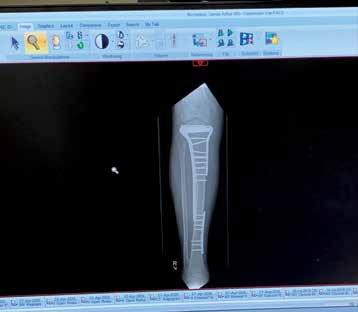

As one trauma after another beset McCluskey, yet another was to come –and strike him just as hard. His 94-year-old mother suffered a fracture of her own in a fall. So, mother and son found themselves in the same hospital but separated by one floor and unable to see each other
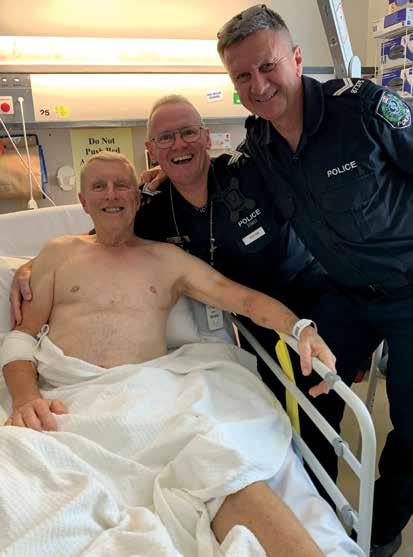
“My mother was underneath me on level four,” McCluskey says “There was just no way I could get there My leg was in a massive frame with bits hanging out of it It just wasn’t possible, and Viv couldn’t go (to see her) either because of COVID ”
McCluskey never got to see his mother again. The hospital discharged her, she went back to her nursing home, and she died a few days later. McCluskey had last seen her the day before his accident
“I said goodbye and then they wheeled him off to theatre. My son and I looked at each other, going: ‘Was that goodbye he’s going to surgery or goodbye we may not see him again?’ ”
But he still had to deal with the long, arduous task of healing The amputation of his leg had, after that 24-hour period, not been necessary
Later, after his discharge from hospital, and with the supply of equipment, like a hospital bed, McCluskey continued his recovery at home Using a step-through bike and an indoor trainer he worked hard to get back to his beloved cycling.
“Eventually,” he says, “with a lot of dedication, hard work, pain and suffering I got back on the bike I started to pedal at home ”
He progressed well and did indeed get back out on the road on his bike Then, 12 months after the accident, in April 2021, McCluskey had to undergo another operation
It was time to take out all the screws and metal which had held his right tibia together Only after that could surgeons operate to replace his knee
“In that operation, to remove all the screws, they couldn’t stop him bleeding,” Muller says. “They thought they were going to lose him that night. ”
But McCluskey survived and later underwent the knee replacement, followed
by some painful rehab And that process is to play out yet again
“I’ve still got metal and screws in this one,” he says, pointing at his left leg “The left knee will have to be done at some point, but I can’t face it mentally right now It’s just not possible; and it (the leg) is operating reasonably well
“My surgeon said: ‘I don’t have a crystal ball but I can tell you it’ll need to be done. The time frame could be flexible.’ ”
As always happens when hard times fall on cops, the police family showed McCluskey its support After the issue of amputation had come up, the hospital gave the okay for a couple of visitors Muller called Rod Parsons and Senior Constable Rick Jones

“They just raced up to the hospital in uniform,” she says, “and it was like a tonic just to see them And the first person on the phone the next day after the accident was (Police Association president) Mark Carroll.
“He arranged meals for me, and it was just such a lifesaver because I didn’t have time to shop, get food or cook I was just mentally drained dealing with everything
“And just to hear (Assistant Secretary) Steve Whetton on the phone and, in his chipper voice, saying: ‘How are you going? What do you need?’ ”
Today, McCluskey speaks of “doing okay” but sometimes drifting into a “little black hole” of depression And viewing CCTV footage of the accident was one task he was never prepared to undertake.
Says Muller: “He said right from the word go: ‘I can’t do that.’ The more we tried to poke around his memory the more he said: ‘I can’t remember ’ And we knew that he’d just get massively depressed if we poked around there too much ”
McCluskey still insists that he will never watch the footage
“When you suffer something this bad,” he says, “you’re in a very dark place But I’ve still got a leg, I can still ride my bike, and I can still walk half decent I’m thankful, but I can’t help but remember the dark places as well
“There’s only two things in my life: cycling and my wife. Vivien’s had to endure nearly as much as I have. Probably more, (at least) mentally. I’ve told her that, without her, I don’t know whether I’d actually be here ”
“Vivien’s had to endure nearly as much as I have. Probably more, (at least) mentally. I’ve told her that, without her, I don’t know whether I’d actually be here.”McCluskey with wife Vivien Muller.

always wanted to be a cop The draw for him was the security and camaraderie synonymous with police work But he just never got the opportunity to join a police force until he was 53
Had he remained in his birthplace of Farmington, Minnesota, USA – where his grandfather was the chief of police – he might have become a cop way earlier
“He (my grandfather) was a very good man, from what my mother told me,” McCluskey says. “I didn’t know too much about him because mother got divorced when I was two and went back home which, for her, was England. And, of course, I went with her ”
After later immigrating to Australia, McCluskey worked in a range of fields Among his jobs were those of carpet layer, boilermaker, welder, and 20 years as a motor mechanic in local government.
The one barrier between him and a police career in those days was his lack of Australian citizenship. He held permanent residency in Australia but, for a long time, that was not enough to join an Australian police force
“It was a problem at that time,” he says “And it wasn’t until a friend of mine had joined the job that I happened to see the paperwork just sitting on his table
“I saw that the requirement had changed to a permanent resident of Australia, which obviously I was by then I’d been here a long time ”
So, McCluskey applied to join SAPOL and got the job. As the oldest-ever SA police recruit, he undertook his training at Fort Largs in 2000 and he concedes that he found it daunting.
After graduating, he served at Glenelg police station until just before its closure Then, in 2002, he moved on to Netley patrols
But, as a former mechanic, McCluskey had a natural interest in traffic policing and so took a secondment to Sturt Traffic in 2006 He remained a traffic cop until 2016, when a vacancy came up at Sturt Property Section
“It felt right to do it,” he says “I’m an extremely well-organized person I like everything neat and tidy and mathematics was always my (thing) I could do stuff with mathematics and numbers. ”
McCluskey scored the job and got to work with three Sturt Property Section colleagues.
“Then,” he says, “there was an amalgamation of several property stores into Edwardstown (Southern Exhibit Property) We finished up with about six or eight staff there ”
McCluskey and his colleagues took responsibility for the storage and security of what he estimates to be around 500,000 items of found, deceased and exhibit property
And the range of items was, and remains, vast An exhibit in one case might be just a cigarette butt and, in another case, material from the NCA bombing.
McCluskey stuck with his work in property until the day he wound up with his legs crushed and his life under threat. Now 75, he remains on longservice leave and expects to retire next year PJ
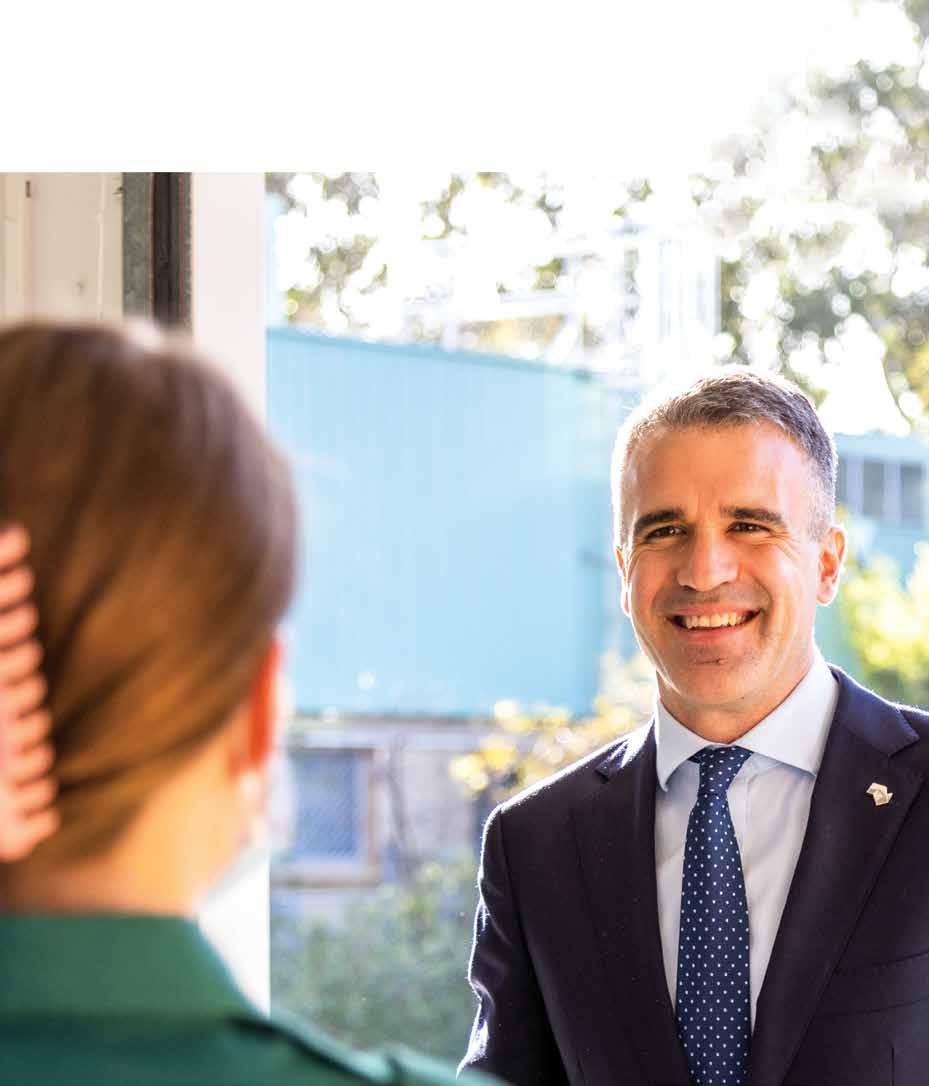

The new SA premier and Opposition leader both claim a good knowledge of the hard yakka of policing. But just how good is their understanding?
By Brett WilliamsTHE CONSENSUS WAS THAT PREMIER PETER MALINAUSKAS cut a fine topless figure in a pool at the Adelaide Aquatic Centre back in February. His appearance might have led some to envision that trim physique of his clad in a police uniform And why not?
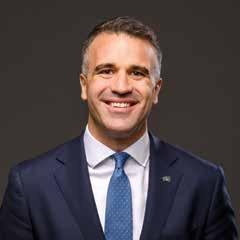
Policing was, after all, the career he thought he “really wanted” as a schoolboy He even undertook work experience with police at the Henley Beach police station
“I thoroughly enjoyed it,” he recalls “I thought it was pretty amazing but I remember during that exercise it was hard work . It was facing challenging situations, and not (ones) always consistent with what most punters think .
“I think most punters think it’s all lights and sirens but, in actual fact, there’s a real
community service obligation that comes with the role. Quite frankly, (police work) has the ability to wear people down. ”
And it might have worn Malinauskas down had he followed through on that early instinct to pursue a police career Instead of walking the halls of power in state parliament he could have been walking the Hindley St beat, enforcing laws rather than making them
“But I jumped around a bit,” he says, “worked out pretty quickly I wasn't going to be a professional sportsperson, as much as I would’ve hoped I was always interested in doing something that had a connection to public service and a sense of social justice. ”
As Malinauskas “jumped around a bit”, all four of his grandparents influenced him “massively”. He speaks of them as “utterly formative to my world view”
Their backgrounds were Irish Catholic on one side and eastern European on the other. Grandparents Eta, from Hungary, and Peter (Malinauskas), from Lithuania, fled the communist oppression of their post-war countries to come to Australia, where they met and married
What so impresses their grandson is that they arrived with nothing besides a serious work ethic and determination to seize opportunities
“I didn’t realize it at the time,” Malinauskas says, “but (their character traits) were being embedded in me in every interaction that I possibly had with them. ”
Malinauskas has never visited Lithuania but did travel to Hungary to meet a member of his extended family His grandmother, widowed at age 20, had had a daughter from whom she got separated She was never able to get back to Hungary to see her, but Malinauskas did
“And that was a big deal for the family,” he says
Malinauskas got to emulate his grandparents’ work ethic when, as a 15-year-old Mercedes College student, he started work as a Woolworths trolley boy.
He joined the Shop, Distributive and Allied Employees Association (SDA) and stuck it out at the supermarket for seven years And, in that time, he studied for and scored a degree in commerce
He also became a union delegate and, in that role, met Don Farrell, the longserving state secretary of the SDA and now Labor senator Farrell ultimately offered him a job as a union representative and mentored him
By 2008, Malinauskas had himself become SDA secretary after Farrell won a seat in the Australian Senate in the election of November 2007. And the new boss would lead the union for the next seven years
So, one thing he should, and likely does, understand about more than 97 per cent of SA police officers is their union participation
He sees the Police Association as highly influential but does not buy the argument that, through their unions, police wield too much industrial and political power
“Of course they (police) should be able to unionize,” he insists. “It’s the ability to unionize and organize and collectively bargain which, for me, is a fundamental right within a modern liberal democracy
“When people come out and say: ‘Oh, unions are too powerful,’ they’re basically saying workers should shut up and take what they’re given, and I don’t agree with that ”
Tough but fair is how he describes the Police Association as a lobbyist, campaigner and representative body. And he attributes its clout to its leadership and ability to “work across the political divide”.
“I think PASA and South Australia has enjoyed highly professional and effective presidents,” he says “There’s of course Mark (Carroll) and, before him, Peter Alexander These have been good people to work with ”
Of course, Malinauskas and Mark Carroll became leaders of their respective unions in the same year But with the political demise of disgraced MLC Bernard Finnigan came a vacant seat in the Legislative Council in 2015. Malinsauskas stepped in, and his parliamentary life began.
And he was to find himself with an almost instant connection to cops through his appointment as police minister the following month
When he took on the portfolio, however, the Weatherill Labor government was engaged in, but losing, a bitter fight with the Police Association
The issue was the Return to Work Act and the limitations it imposed on compensation entitlements for injured police officers and other workers.
Negotiations continued, with the involvement of the newly appointed police minister, until the association won the day
That meant the restoration of the lost entitlements for police
And then came the equally bitter fight over Recruit 313 The Weatherill government had repeatedly reneged on a years-old commitment to boost police numbers.
“I negotiated with Mark Carroll,” Malinauskas says. “It was a controversial negotiation at the time but we got the funding there and the recruitment commenced And it was a record-level ramp-up in recruitment to realize that objective (of 4,713 FTE police) ”
When the opportunity to run for the strong Labor seat of Croydon came up, ahead of the 2018 election, Malinauskas took it The now former member for Croydon, Michael Atkinson, had chosen to stand down
Labor lost the election and Jay Weatherill resigned the leadership. Three weeks later, the Labor caucus elected Malinauskas to lead the party. As Opposition leader, he took responsibility for the shadow ministries of jobs and defence and space industries
At the 2022 election, Malinauskas led his party to a convincing win, ousting the Marshall government after just one term
“Of course they (police) should be able to unionize. It’s the ability to unionize and organize and collectively bargain which, for me, is a fundamental right within a modern liberal democracy.”
DAVID SPEIRS had become concerned about his next-door neighbour Barry seemed to be missing No sign of him on his balcony, where his politician neighbour would always see him He had not appeared there for several days.
Speirs tried phoning him but got no answer and so called the police. Two patrols turned up to help unravel this missing-neighbour mystery. After Speirs briefed them, officers decided to see if Barry had suffered an injury or was even dead inside his unit
They forced entry through a window and did indeed find Barry – dead He appeared to have fallen over and died some days earlier so his body was “in a bad way”
The police proposed that Speirs identify the body but he instead provided them with a description of Barry What Speirs saw of the patrol crews’ response to “a difficult situation” reaffirmed his “total respect” for police.
“That was my biggest and most intimate interaction with the police on a pretty traumatic event,” he says “This bloke was my neighbour and he’d been lying dead within metres of me for several days ”
But Speirs already had what he considered “a fairly good insight” into police work . Three of his close mates who are cops had helped make him well informed He still catches up with them and hears their stories of both city and country policing
Speirs also knows many former UK but now SA police officers who, along with him, live in Hallett Cove in his electorate of Black Even his parents’ next-door neighbours are police officers
Like all politicians, Speirs speaks of his support for, and empathy with, police. Sceptical cops might reject that out of hand. But Speirs seems genuinely empathetic when it comes to issues like the COVID vaccination mandate Commissioner Grant Stevens imposed on police
“I didn’t like those workforce mandates,” Speirs says “They didn’t sit comfortably with me overall I’ve got a mate who left the workforce because of that and he hasn’t come back
“I’m sad for him … and I’m pretty sure he’s not the only one In fact, I had two people who I knew who stepped away (from policing) during that time. One of them is back, one of them isn’t. ”
Of course, the police issues which concern Speirs now are those of understaffing, recruitment, the district policing model, and low morale
“There is clearly an angst in the (police) workforce at the moment,” he says “But, at this point, I think that angst is starting, bit by bit, to drift into the community
“It’s very difficult for me to criticize the commissioner (for that) at this stage I’ve been in this job (as leader) for 80 days I’ve got to sit back and really learn about areas that I didn’t have a ministerial responsibility for, policing being one of them. ”
The Premier’s Task Force has begun its deliberations on police resourcing and numbers but the Opposition has no seat
at its table. Speirs insists, however, that his party “will, and should, have things to say”.
It never seemed likely 20 years ago that Speirs would ever have to comment on SA policing or any other political issue Back then he was a 17-year-old living in his native Scotland His only experience of Australia was a holiday here with his family in 1998
He enjoyed the trip but was unhappy when his parents decided to immigrate to Australia, with him and his two younger brothers, in 2002 Speirs senior was a tradie and the family had lived on a farm with aunts, uncles and cousins.
“I’d come from a little town (Kirkcolm) in a very isolated area so we knew everyone and everything,” he says. “I’d never driven through traffic lights before and I'd just got my licence before we moved here ”
So, Adelaide struck Speirs as the one thing no Australian would never call it: a massive city But that was compared to his tiny hometown
“It (life) was very difficult but only for about 12 months,” he recalls “Then I got into life here and I felt: ‘This is all right ’ ”
Although he describes his family as “completely non-political”, Speirs had always had at least a mild interest in politics.
He had never envisaged anything like leading a branch of an Australian political party But he did stand for and win election to office as a City of Marion councillor in 2010 Speirs was by then working as a policy manager in the Department of Premier and Cabinet And, before that, he had scored degrees in law and environmental studies and undertaken charity work in Uganda
In 2011, after 11 months as a councillor, Speirs became the City of Marion deputy mayor. But in a later attempt to move into state politics, he stood as the Liberal Party candidate for the seat of Bright (now Black).
He outpolled sitting member and thengovernment minister Chloe Fox to claim victory in the 2014 election

“That’s how the journey began,” he says “But I really wanted to be the environment minister … because that’s where my passion lay ”
Speirs did indeed score the environment portfolio after the Liberal Party won the 2018 election He had served as the shadow environment minister since 2017
His election as Liberal Party leader came in April this year after the party suffered defeat at the 2022 election and Steven Marshall resigned the leadership.
“I didn’t like those workforce mandates. They didn’t sit comfortably with me overall. I’ve got a mate who left the workforce because of that and he hasn’t come back.”
PREMIER:
“I feel for officers who are under the pump on the front line. I’m worried about the ability to recruit to the level as required…
“… to find ourselves in a situation where (we’ve) been struggling to maintain that level (of recruitment) simply because we don’t have enough people applying is a worry ”
OPPOSITION LEADER:
“It concerns me. ”
“… low morale, a model that might not be working properly, the whole complexities of COVID that took people out of the traditional policing workforce, that all comes back to presence Presence (of police) in the community, or lack thereof, potentially undermining confidence
“People (police) might not be there when you need them I think everyone does think, and has a right to think, that if something goes wrong in their lives, a three-digit telephone number will get a pretty quick response ”
PREMIER:
“Clearly, I rely on advice from the police commissioner. But … political leaders, ministers, the premier, they have to have multiple sources of truth
You can’t just rely on one source of information to be able to make a judgement on a policy ”
“… that’s where Mark Carroll and PASA have a fundamentally important role ”
“(In) my time as police minister, I’d speak to a lot of police officers. I’d try to invest a lot of effort in actually going out and talking to people rather than just relying on commissioner’s briefings to understand the work that police do ”
OPPOSITION LEADER:
“It’s got to be a bit of both You’ve got to obviously speak to the management of policing in this state but you’ve … got to talk to people in the front line or at least the people that represent them. Otherwise, you’d be in an ivory tower and … get told what people want you to be told. You’ve got to get out there You’ve got to speak to people ”
“For a police officer currently on the front line, they need all the support they can get so this is but one of the issues we’re looking at in terms of the police task force There’s also the way we’ve used PSOs That’s important as well, and also looking at what’s happening with demand going forward
“Is it the case that we’re currently experiencing an usual level of demand that’ll go back to a more normal level? Or is this something that we should expect for the longer term?
“These are all the sorts of questions that need to be contemplated through the Premier's Task Force And I’m very glad that PASA’s part of that exercise, as they should be ”
“Clearly there are big challenges with policing in South Australia at the moment and so that’s why I’m pleased to see that there is a review going on. I hope there's some frank and fearless discussions in that ”
“It would be nice if there was (Opposition participation) Much is made about the relative independence of the police force from the day-to-day political operations of the state
“The way to really underpin that is to have a level of bipartisanship around long-term thinking and reform in the police service. So … if we can’t sit at the table, perhaps there’s a way we can feed into it (the Premier’s Task Force) ”
PREMIER:
“I don’t think it was misuse. ”
“… three years ago, it would’ve been inconceivable that a day would ever come where we were closing the state’s borders to other parts of the country, but if not SAPOL then who?
“… if, all of a sudden, South Australians woke up and every police officer was on the beat policing mask-wearing … then I think there’d be a few people going: ‘Hang on, what's going on here. ’
“But I think the great virtue of the pandemic is that the police handled a difficult situation and the application of extraordinary powers in a thoughtful and measured way
“I can imagine a police officer might have woken up one day and thought: ‘I got into this to catch crims, not to stop people coming into the state…’ I think police officers could be forgiven for having that sense of frustration…”
“… police clearly had a role but it perhaps went on too long And I knew people who, as part of SAPOL, went out and spent very lonely days on the border cross points and things like that ”
“And … sitting in cafés when the police come in to make sure people are wearing masks and make sure there’s only six people out the back in the side room. I do worry that that undermined faith in policing, that it created fear and added to fear, potentially (of police) ”
Police management’s use or misuse of police in the COVID-19 pandemic
The current state of policing (DPM, understaffing, lack of recruitment, low morale)
Politicians taking too much advice from police management and too little from rank-and-file cops
“I’d provide that answer (that I couldn’t comment on an operational matter). I hated saying it, but it’s the truth.”
PREMIER:
“Well, I don’t think it’s compromised policing. I mean it’s a policy that’s been in place for some time now and I don’t think it’s left SAPOL any worse off, and I could see a lot of arguments about how it’s made SAPOL better off
“It was a courageous move at the time from the police commissioner And I think it’s a move that’s largely been rewarded. ”
OPPOSITION LEADER:
“I think we need to find solid and clear pathways to help women get into the police workforce, if they want to, but I wouldn’t obsess over a 50-50 target ”
“I belong to a party that will always put merit first because I believe there’s plenty of good women out there who are capable of politics and capable of policing. ”
“You’d hate to think that there would be people who would be brilliant police officers missing out because … there was a particular target in place ”
PREMIER:
“They’re complex . The police commissioner has a lot of unfettered authority … and I actually think that’s appropriate because, while there might be drawbacks on that, the alternative is far worse The alternative being political control of the police force…”
“So, the dynamic between those three is unique ”
“You want a degree of harmony (but) how often that happens… I don’t know if there’s ever pure harmony. ”
OPPOSITION LEADER:
“Well, they all have important roles to play ”
“But there should always be a healthy tension between each of the levels You don’t want any one of those three out in the front doing everything Otherwise, the system will probably break down ”
PREMIER:
“Well, the media's got a job to do and the media giveth, the media taketh. That’s the rule of it My view is you’ve got to be professional, that media have an important role to play in our democracy, and that should always be the case ”
“I don’t think the media always get it right but I don’t think they always get it wrong either So, in that respect, they’re no different to any other organization or human being. ”
OPPOSITION LEADER:
“We’re drifting into really difficult space Media coverage now is all about the click online ”
“Policing is very vulnerable to the headline because it’s not dissimilar from the sort of world that I occupy where it’s quite easy to sensationalize or take things out of context ”
PREMIER:
“When I was police minister, I’d get asked questions about operational police matters and I’d provide that answer (that I couldn’t comment on an operational matter) I hated saying it, but it’s the truth You can only tell the truth ”
OPPOSITION LEADER:
“Well, people are entitled to be frustrated by that (evading questions). I try not to do that.
But (journalist) Matthew Abraham wrote a column in the paper the other day saying that my downfall would be my honesty, and I don’t think it will be I think it’ll be my success ”
“… people want to hear a straight answer ” PJ
Commissioner Grant Stevens’ 50-50 gender recruitment strategy
Dynamics of the power trio: police minister, commissioner, police union president
“I think we need to find solid and clear pathways to help women get into the police workforce, if they want to, but I wouldn’t obsess over a 50-50 target.”

C orruption is wrong, but in our zeal to see corrupt public officials dealt with appropriately, we must not discard the protections of the rights and liberties that are central to our legal system
The federal government is soon to introduce a bill for a national corruption commission Based on many years of combined experience as barristers in dealing with corruption commissions in various jurisdictions, we believe great caution should be taken before creating such a body.
If the parliament is going to legislate for such a body, it should give serious consideration to the South Australian model as recently amended
Those amendments were supported by every single member of the South Australian parliament – Labor, Liberal, Greens, SA Best and independent
Any concept that receives unanimous support through a parliament deserves close attention when similar concepts are under consideration.
The reformulated SA corruption commission splits maladministration and misconduct issues from corruption investigations and leaves these as matters for the ombudsman The South Australian model leaves only serious corruption defined as the breach of certain criminal offences for the commission to investigate
Further, it creates an independent clearing house to handle complaints –the Office of Public Integrity –to decide which matters should go to which body.
It maintains private hearings, a very important protection for the people appearing before the commission
The amendments were put forward following what was seen by members of parliament as a serious overreach by the South Australian ICAC which led to a suicide and the destruction of the lives and careers of several public servants and police officers
The reformulated South Australian act strikes the delicate balance of dealing appropriately with serious corruption while protecting the reputation of innocent public officers.
While it is not perfect and (we suggest) more safeguards are needed, the federal parliament should give serious consideration to adopting and improving the South Australian model
Corruption commissions across the country have extraordinary powers Terrorism suspects are given more rights when criminal charges are brought against them than a public servant who is brought before and anticorruption commission.
Without adequate safeguards, corruption commissions have the capacity to operate as a star chamber and to have consequences that are significant and irreparable
There is no right to silence The right against self-incrimination is lost If you decline to answer questions you can be held in contempt and jailed Gag orders prevent you from telling anyone (even your partner) that you have been questioned by the commission
In a criminal trial, the law acknowledges that the prosecution has many more resources at its disposal than the accused . To balance the scales, a person charged with an offence is presumed innocent until proven
guilty and the burden of proof rests with the state throughout Corruption commissions, on the other hand, have powers that the police do not have, and the presumption of innocence does not apply
In our experience, the process and stigma of being a person who has appeared before a corruption commission (should that appearance be made public) becomes a very severe punishment.
Some commissions outside SA hold public hearings that result in public humiliation and the destruction of reputations The processes invoked by corruption commissions bear no relationship to the fair processes a court must apply
We have been involved in representing numerous people who have suffered greatly at the hands of the South Australian ICAC The South Australian experience (preamendments) should be a cautionary tale to those considering the shape of the national anti-corruption commission.
There have been many failed prosecutions in South Australia as a result of an ICAC investigation Under the federal government’s corruption commission principles, the proposed commission will not just investigate politicians It will have the power to investigate public servants, contractors to government, their employees and others who have had only incidental contact with the federal government.
Any concept that receives unanimous support through a parliament deserves close attention when similar concepts are under consideration.Michael Abbott KC, Marie Shaw KC, and David Edwardson KC
• Police Association president Mark Carroll recently lodged a written submission with the SA Crime and Public Integrity Policy Committee of state parliament.
• The committee is holding an inquiry into the operation of the Police Complaints and Discipline Act, 2016.
• Association in-house counsel Craig Stevens gave Nick Damiani an outline of several key points in the president’s submission.
Mr Stevens highlighted that, in the view of the association, management resolution is sometimes used against members inappropriately
“Resolution officers often find complaints as ‘substantiated’ in circumstances where there is no reasonable grounds based on the balance of probabilities,” he said.
“It’s clear that members are not always effectively afforded procedural fairness, that’s why the association has advocated legislative change
“Furthermore, it is fundamental that members should be provided with a legislative right of review for matters addressed by management resolution
“There is no reasonable basis that police officers should have lesser entitlements than public servants to challenge administrative decisions If anything, they should have greater entitlements.
“SAPOL management should be prepared to defend their decisions . The Police Disciplinary Tribunal should
be provided with additional jurisdiction for challenges to management resolution matters ”
Mr Stevens said there is a concern that SAPOL management sometimes misuses administrative orders.
“This includes orders which inflict de facto punishment on members, those which continue after the management resolution, or those which unjustifiably exceed what is reasonably necessary for the control and management of SAPOL,” he explained
There are also no reasonable available means for a member to challenge an administrative order, as Mr Stevens highlighted
“Again, police officers should have rights of review which are at least equivalent to those of public servants, including the right to challenge the legitimacy of administrative orders,” he said
A lack of consistency from SAPOL management in respect of the suspension of members is another focus of the association’s submission
“Suspension from duty should only occur in very limited circumstances — and after a member has been afforded procedural fairness,” Mr Stevens said.
“Suspension can sully a member’s reputation and affect him or her financially, regardless of the eventual outcome
“The association believes the act should be amended so that certain conditions must be present if the commissioner or a delegate suspends a member from duty
“We say that suspension should only be permitted if a member is charged with a criminal offence, or if it’s deemed necessary in the interests of public or organizational health and safety, or to protect the integrity of relevant evidence ”
Mr Stevens said the association had long held the view that it is commonplace for management resolution and investigations into suspected member misconduct simply take too long
“We say that suspension should only be permitted if a member is charged with a criminal offence, or if it’s deemed necessary in the interests of public or organizational health and safety, or to protect the integrity of relevant evidence.”
Members speak openly to me about their workplace concerns I take their willingness to do that as a compliment They should always feel free to confide in Police Association office-holders What they have to say forms the basis for much of the advocacy the association undertakes on their behalf
This is why genuine engagement is critical . It engenders trust and confidence and enables us to operate as a powerful collective.
And collectivism gives us the best opportunities to achieve impactful outcomes in such areas as well-being, safety, job satisfaction, and pay and conditions
The failure to progress the implementation of the response extended-hours roster is one issue of concern to members Their lack of confidence in DPM2 is another
SAPOL has failed to attract police recruits, or even combat attrition . Members are voicing their concern about this dire staffing situation which exacerbates the existing impact of demand exceeding capability
Equally concerned, well-intentioned managers do their best to make this bad situation work but the failure to attract recruits has caused workplace hazards SAPOL, in its response to the front-line staffing crisis, has restricted secondments and delayed promotions and transfers.
Members have asked:
• “How is it fair my promotion or transfer is delayed; my anniversary
date is pushed out and I’m financially disadvantaged?”
• “Why am I being penalized for SAPOL’s lack of recruiting?”
Restricting the secondments of front-line officers might be intended to maintain maximum resources at the coalface but it further penalizes those same police officers who suffer most under relentless workloads
Patrol officers suffering burnout and seeking to diversify their professional experience or decompress from the rigors of 24-7 police work are robbed of those opportunities.
District Support Section staff are providing much-needed assistance to realign time-consuming tasks (related to the security of people) away from district resources
And the mental-health co-response trial in Northern District aims to deliver more efficient management of mental-health incidents This is to reduce police time spent on scene, transporting patients, and waiting at hospital.
Police Association president Mark Carroll and assistant secretary Steve Whetton and I are members of the Premier’s Task Force We aim to ensure that the development of a sustainable staffing model is one of the results of our input
Members are vocal in their concern about stalled promotions and the promotional framework . It would seem time for a fairer, more objective, centralized promotional assessment process
Wade Burns Deputy President Police AssociationRestricting the secondments of front-line officers might be intended to maintain maximum resources at the coalface but it further penalizes those same police officers who suffer most under relentless workloads.
Officers of police continue to voice their concern about the absence of the right to independent reviews of promotional selections above the rank of inspector There is no avenue through which to lodge a grievance
We live in an era of demand for transparency Oversight and a focus on anti-corruption measures have increased So, a sound argument exists for all promotional positions, up to and including the rank of chief superintendent, to be open to appeal and, where reasons exist, independent review.
Under discussion with the government is the legislative recognition of officer-of-police positions as “prescribed promotional positions”
Justice delayed is justice denied
Over-long disciplinary investigations and outcomes and administration orders, used in a way many consider to be a punitive fashion, are further concerns.
These processes come with an impact on promotional opportunities, transfers, and secondments And that causes members to suffer mental anguish and anxiety, which could otherwise be reduced, or avoided, by sticking to reasonable timeframes and appropriate communication
The association has written to Commissioner Grant Stevens to raise its concerns about the use of administrative orders and associated disciplinary processes.

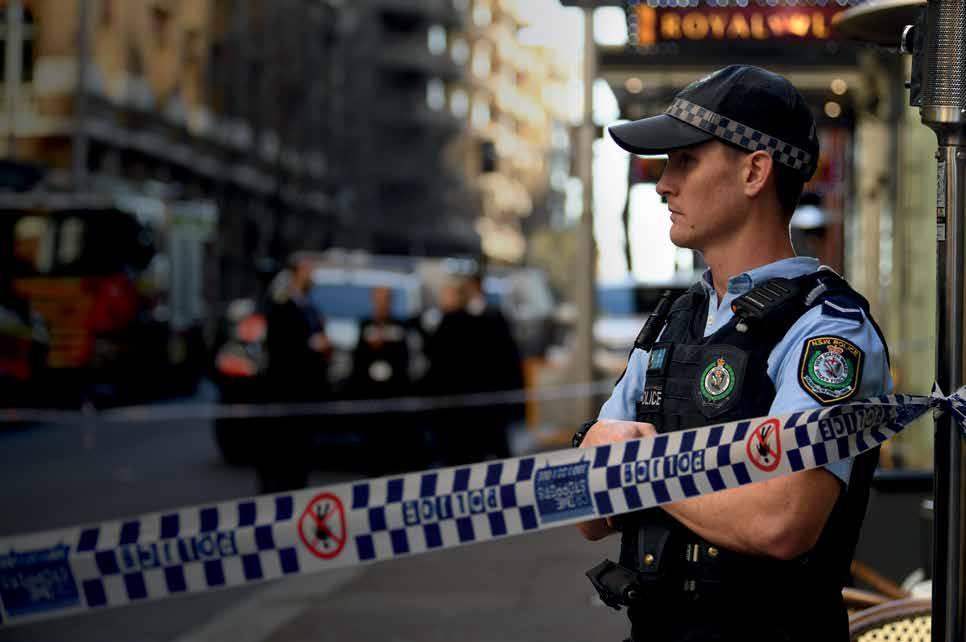
O ne syndrome which tests our neurological diagnostic skills is the so-called foreign accent syndrome (FAS)
It is a rare motor speech disorder which causes patients to speak their native language with an accent
This non-native way of speaking is the result of changes in their speech which, according to a 1982 definition, are the consequence of damage to the central nervous system.
Often, the cause is a stroke or brain trauma affecting the languagedominant areas of the brain, usually the left side just behind the frontal lobe
But FAS has also been associated with other causes and been described in association with multiple sclerosis and cancers (primary or secondary) Sometimes, despite the best X-ray or MRI, no cause is evident
There are reported cases of patients speaking differently after trauma (such as a car crash) but no abnormality is seen on brain X-rays.
The more common form of FAS is where an abnormality is found in the brain This discovery came about in the past by looking at the brain post-mortem but now by use of new imaging techniques
Disputed still is the possibility that, following a head injury, concussion might cause the accent to change
Broadly, FAS probably falls under the diagnosis of a form of aphasia
Aphasia is usually a symptom of brain injury. It can present in many forms because the way we are able to speak requires multiple parts of the brain. It is a complicated process.
Aphasia might present through:
• Speaking in short or incomplete sentences
• Speaking in sentences that don't make sense
• Substituting one word for another or one sound for another
• Speaking unrecognizable words
• Difficulty finding words
• Not understanding other people’s conversation
• Not understanding what one reads.
• Writing sentences that don't make sense.
Because speech is such a complex neurological process it is not unreasonable to think that, by chance, someone might, after a brain injury, seem to be speaking his or her native tongue with an accent
The most common cause of aphasia is brain damage resulting from a stroke — the blockage or rupture of a blood vessel in the brain
Loss of blood to the brain leads to brain cell death or damage in areas that control language. The ability to recover depends on the severity of the original injury or damage to the brain.
Stories of FAS date back to the 1900s.
Although brain damage can usually be found in these cases, there are a dozen or so in those 100 years where no damage is found
A neurologist described one of the most famous cases in which brain damage was clear


During a German air raid over Oslo in 1941, shrapnel struck a 30-year-old Norwegian woman on the left side of her head . She suffered Broca’s aphasia –a defect in which part of the brain which co-ordinates speech is damaged and causes an inability to produce language – and a seizure disorder
Because speech is such a complex neurological process it is not unreasonable to think that, by chance, someone might, after a brain injury, seem to be speaking his or her native tongue with an accent.
Within a year, her language improved but her speech had an altered rhythm and melody suggesting a foreign accent, and she had never left her country
The respected neurologist Georg Herman Monrad-Krohn described this incident in a detailed 1947 case report. The study led to the term foreign accent syndrome.
Since this famous case, around 40 individuals with FAS have been described in world literature
Reported accent changes include Japanese to Korean, British English to French, US English to British English, and even Spanish to Hungarian
The changes in speech – variations in melody, intonation, pauses, stresses, intensity, vocal quality and accents –might be more about our interpretation rather than a real disorder. Perhaps making us think it must be a different language accent rather than just a change in the way someone is talking
Charging 35 minutes from 50kWh DC charger, three hours from AC wall box or 6 6kWh public charger, nine hours with portable charger from standard 10-amp home socket (all times quoted to recharge from 20 to 80 per cent of battery capacity)
Safety Five-star ANCAP safety rating, 10 airbags, full suite of driver-assistance and crash-avoidance technologies, tyre-pressure monitor, front and rear parking sensors, 360-degree multi-view camera system, head-up display
Cargo Space 311 litres
Servicing/Warranty Service every 12 months or 15,000km, total cost $1,273 for five years . Five-year unlimited-kilometre warranty with eight-year battery warranty.
Mazda has based its first full electric model on its MX-30 Mild Hybrid MX-30 teases the market with a unique design approach. Its relatively tall SUV body blends into compact coupe styling at the rear. Pushing the envelope further, designers endowed MX-30 with freestyle (rearward opening) rear doors last seen on the RX-8 Although trendy-looking, they complicate access to the rear seat which is itself a little tight for adults
A stylish front end, unique 18-inch alloys and smart rear tailgate with LED lighting add to the appeal Although available in various single colours, there are three-tone colour options that look stunning
Available in top-spec Astina grade only and priced at $65,490 (plus ORC), MX-30 Electric won’t be for everyone (Mazda does offer Guaranteed Future Value with its finance)

Its superbly appointed interior features a 12-speaker Bose premium sound system, satellite navigation and 360-degree multi-view camera system Active cruise control with stop-and-go function and a comprehensive suite of crash-avoidance and driver-assistance technologies also feature.
Inside it has a premium look and feel, with recycled plastics and cork on some surfaces. The steering wheel is sporty and the 8 8-inch central screen nicely located and easily operated from a consolemounted rotary controller
The single-zone climate-control system comes with its own unique eight-inch screen and there are heated front seats and steering wheel
Push-button entry and start feature along with an eight-way power-adjustable driver’s seat with memory function . Drivers also benefit from head-up display which provides speed, sat-nav and safety info
A single (107kW/271Nm) electric motor drives the front wheels via a single-speed reduction gear transmission Compared to many current EVs, its relatively small 355-volt/35 5kWh battery provides a modest range of 224km between charges

While there are more powerful EVs available, MX-30 Electric is an engaging car to drive. Push the foot down and it has that electric hush-power feel. It’s no slouch off the line, competent on the highway and has plenty in reserve on steep hills
Like most electric cars, it’s smooth and quiet aside from a little tyre noise and a mild whir when accelerating Ride and handling are good as is the steering feel Paddle shifters offer five-step regenerative braking
MX-30 Electric is presentation-perfect but its price, rear-seat access and driving range work against it when compared to others . The latest Hyundai Ioniq 5, for example, has twice the range, and more power and passenger/cargo space.
Safety Ten airbags, AEB with vehicle, cyclist and pedestrian detection, active cruise control with curve speed reduction, road-sign assist, lane-trace assist, auto high beam. Standard Quad-zone auto climate control, equipment 10-speaker Pioneer audio system with DAB radio, satellite navigation, heated/cooled, power-operated front seats, powered sunroof, wireless phone charging
Off-road Full-time 4x4, lockable centre diff, low-range transfer case, six-mode multi-terrain system, 360-degree and under-body camera views, 235mm ground clearance, Crawl Mode
Weights Kerb weight 2,630kg, GVM 3,280kg, Payload 650kg, Towing 3,500kg (braked).
Fuel Diesel 110-litre capacity, 8 . 9 litres/100km (combined test).
Warranty/ Five-year unlimited-kilometre servicing warranty (additional two-year warranty available on engine and driveline), six-monthly or 10,000km servicing – $375 per service (first five years)
premium feel. Charcoal leather-look trim, dark woodgrain and metallic finishes blend perfectly
Along with the release of the 300-Series LandCruiser came a lot of hype And it was all about a V6 diesel replacing the V8 Indeed, the value of 200-Series models went through the roof.
Now the dust has settled, the six-model 300-Series ($89,990 –$138,790 plus ORC) reveals a new, fromthe-ground-up Cruiser with advances in safety, performance, comfort and technology
It is built on a new platform, and Toyota claims improvements in rigidity and stability while shaving weight
A squarer body features a more prominent grille, new LED lighting assemblies, flared mudguards and different side glass. The new one-piece lift-up tailgate might be a concern for some.

Mid-spec VX ($113,990) has a spacious, comfortable interior with a
Three seat rows each offer airconditioning vents, cup holders and USB charging points The splitfold (40/20/40) reclining second-row seats tumble forward to provide access to the third row These now fold flat into the cargo floor and provide sufficient headroom for adults but lack thigh support.
The cargo floor is completely flat and offers between 175 and 1,967 litres of space A full-size spare wheel sits underneath
In VX, the eight-way-powered driver’s seat and power-adjustable steering column provide a commanding view and perfect driving position All controls and switchgear are easy to use and there’s push-button entry/start and an auto (on/off) electric park brake.
The comprehensive gauge layout with central seven-inch colour MID display provides a heap of
information while the large 12 .3-inch central multimedia display is easy to navigate
The all-new 3 3-litre V6 twin-turbo diesel pumps out more power and torque (227kW/700Nm) than the V8 diesel it replaces It’s smoother, quieter and, with maximum torque available between 1,600 and 2,600rpm, feels quicker off the mark and when overtaking on the highway.
The new 10-speed auto goes about its business with a minimum of fuss and never seems to hunt for gears. It allows the engine to spin at a lazy 1,500rpm at 110km/h
VX is perfectly at home on a long highway or dirt road haul, effortlessly soaking up the kilometres, leaving drivers refreshed Given its size and weight, it’s surprisingly sure-footed and able to smooth out rough roads
Out of the box VX has decent off-road capability However, serious off-road driving or heavy-duty towing might require upgrades to suspension and tyres
.



Probationary Constable Chelsea Lieberwirth, 31, received the Police Credit Union Award for Community Service at her graduation with Course 51 in May
At each graduation ceremony, a graduating probationary constable receives the Police Credit Union Award for Community Service in recognition of his or her outstanding service to the community, and Chelsea couldn’t be a more deserving award winner.
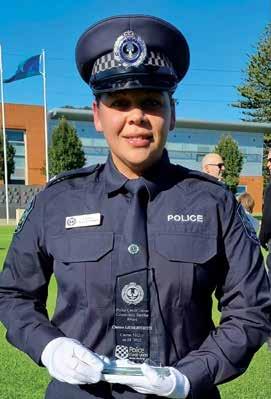
Having previously worked as a SAPOL community constable in Whyalla, Chelsea has developed a strong rapport among her locals and is thrilled to be recognized for her efforts
“Receiving the award at my graduation was quite amazing,” Chelsea said “I believe I have been able to provide the Aboriginal community with the ability to communicate with me, to advocate and be their voice within South Australia Police ”
Since becoming a police officer, Chelsea has volunteered her time to support activities and worthy causes.
She attends many local events, particularly NAIDOC events with her family, and was a key driving force in organizing the first ever Pink Parade for Australian Breast Cancer Awareness Month in October last year
For this fundraiser, academy staff and recruits wore a pink ribbon on their hats during the morning parade to raise funds for the National Breast Cancer Foundation “I helped organize a fundraiser for the National Breast Cancer Foundation last year. This was the first time the SAPOL uniform had the approval … to modify the uniform to add the ribbon. It was a great fundraiser and we raised so much money ”
For Chelsea, the highlight of her career so far has been her time working in Yalata as a senior community constable with her partner, where she built strong relationships with locals
“We built great relationships and integrated ourselves on both a professional and personal level,” she said
“We explored the surrounding landscape and discovered a lot of untouched land. We were accepted within the community and are now welcome to return any time.
“From a professional level, I developed better working relationships by gaining the trust and honesty of local leaders ”
Having grown up in Whyalla, Chelsea very much enjoys serving her local area but aspires to work in cybercrime in the future
“I have always spoken about wanting to work in the cybercrime section,” she said “Although, at the moment, I am really enjoying working in my hometown in the Eyre and Western local service area. ”
Police Credit Union congratulates Chelsea on her recent recognition. As a credit union, we are committed to supporting the community we live in, much like the police officers on which our organization was built It’s for this reason we have sponsored this award since its inception in 1997
The award winner is chosen based on his or her proactive and extensive work within the community, even while studying and making his or her way through the academy
Selection is by a review of the community service activities that each cadet attends during training, with a greater weight given to those activities which promote cross-cultural diversity
Most important, the winner has a key focus on educating the public about how police are approachable and there to serve and protect the community Police Credit Union has proudly offered unique financial products and services to police officers for more than 50 years. If you would like to find out more about our Platinum package benefits and discounts, visit policecu com au/platinum or get in touch with one of your dedicated relationship managers, Glenn Lewis and Ryan Mountford E-mail them at platinum@policecu com au or give Glenn a call on 0421 243 741 or Ryan on 0437 286 804
Police Credit Union Ltd ABN 30 087 651 205 AFSL/Australian Credit Licence 238991. Terms, conditions, fees, charges, lending and membership criteria may apply. Full details upon request. All information is current as at 30/08/2022.

“I believe I have been able to provide the Aboriginal community with the ability to communicate with me, to advocate and be their voice within South Australia Police.”
Almost every graduating class had a girl who disappeared A decades-old crime threatens to tear apart three generations of women
1949: it is the coldest winter Orcades Island has ever known, when a pregnant 16-year-old arrives at Fairmile, a home for “fallen women” run by the Catholic Church She and her baby will disappear before the snow melts
2013: Frankie Gray has come to the island for the summer, hoping for one last shot at reconnecting with her teenage daughter, Izzy, before starting a job as a deputy sheriff.
They are staying with her mother, Diana, at The Fairmile Inn, soon to be a boutique hotel But when an elderly nun is found dead in suspicious circumstances, and then a tiny skeleton is discovered in the grounds of the house, Gray is desperate for answers

For your chance to win one of the books or an in-season pass to one of these films (courtesy of Wallis Cinemas) featured in this issue, send your name, location, phone number and despatch code, along with the book and/or film of your choice to giveaways@pj.asn.au
Chris Hammer Allen & Unwin, $32 99
A man runs for his life in a forest A woman plans sabotage A body is unearthed
Newly minted homicide detective Nell Buchanan returns to her hometown, annoyed at being assigned a decades-old murder
But this is no ordinary cold case, as the discovery of more bodies triggers a chain of escalating events in the present day
As Buchanan starts to join the pieces together, she begins to question how well she truly knows those closest to her Could her own family be implicated in the crimes?
The nearer Buchanan comes to uncovering the secrets of the past, the more dangerous the present becomes for her, as she battles shadowy assailants and sinister forces. Can she survive this investigation, and what price will she have to pay for the truth?
1989
Val McDermid Sphere, $32 99
It’s 1989 and Allie Burns is back. Older and maybe wiser, she’s running the northern news operation of the Sunday Globe, chafing at losing her role in investigative journalism and at the descent into the gutter of the UK tabloid media

But there’s plenty to keep her occupied The year begins with the memorial service to the victims of the bombing of Pan Am Flight 103 But Burns has barely filed her copy when she stumbles over a story about HIV/AIDS that will shock her into a major change of direction.
The world of newspapers is undergoing a revolution There’s skulduggery in the medical research labs and there are seismic rumblings behind the Iron Curtain
When kidnap and murder are added to this potent mix, Burns is forced to question all her old certainties.
Allen & Unwin, $32 99
A town ruled by fear A cop who won’t be broken.
Queensland in 1976 churns with corruption When Detective Ray Windsor defies it, he is exiled deep into the state’s west It’s easy out there to feel alien in your own country

Royalton is a town on its knees, stricken by drought, riven by prejudice, and plagued by crimes left largely un-investigated by the local police chief, Kennedy, and his elusive boss

Mutual dislike between Kennedy and Windsor gradually turns ugly as Windsor and his new partner, Arshag, uncover a pattern of crimes that no one seems concerned about solving.
But when two girls from local immigrant families are found dead and another disappears, Windsor and Arshag are forced to take the law into their own hands Not knowing who to trust, or how deep the corruption runs, how long will it be before their lives are also threatened?

Peter Papathanasiou
Quercus, Hachette Australia, $32 .99
Jane Harper Macmillan Australia, $32 99

At a busy festival site on a warm spring night, a baby lies alone in her pram, her mother vanishing into the crowds.
A year on, Kim Gillespie’s absence casts a long shadow as her friends and loved ones gather deep in the heart of South Australian wine country to welcome a new addition to the family
Joining the celebrations is federal investigator Aaron Falk . But as he soaks up life in the lush valley, he begins to suspect this tight-knit group might be more fractured than it seems.
Between Falk’s closest friend, a missing mother, and a woman Falk is drawn to, dark questions linger as long-ago truths begin to emerge
Burnt out from police work, Detective Sergeant George Manolis flies from Australia to Greece for a holiday
Recently divorced and mourning the death of this father, who emigrated from the turbulent Prespes region – which straddles the borders of Greece, Albania and North Macedonia – Manolis hopes to reconnect with his roots and heritage.
On arrival, he learns of the disappearance of an “invisible” – a local man who lives without a scrap of paperwork
The police and some locals believe the man’s disappearance was pre-planned, while others suspect foul play.
Reluctantly, Manolis agrees to work undercover to find the invisible, and must navigate the complicated relationships of a tiny village where grudges run deep
The original action-adventure Strange World journeys deep into an uncharted and treacherous land where fantastic creatures await the legendary Clades, a family of explorers whose differences threaten to topple their latest and — by far — most crucial mission

Cast: Lucy Liu (Callisto Mal, voice), Jake Gyllenhaal (Searcher Clade, voice), Dennis Quaid (Jaeger Clade, voice), Gabrielle Union (Meridian Clade, voice).


Queen Ramonda, Shuri, M’Baku, Okoye and the Dora Milaje fight to protect their nation from intervening world powers in the wake of King T’Challa’s death.
As the Wakandans strive to embrace their next chapter, the heroes must band together with the help of War Dog Nakia and Everett Ross and forge a new path for the kingdom of Wakanda
Cast: Angela Bassett (Queen Ramonda), Letitia Wright (Shuri), Winston Duke (M’Baku), Martin Freeman (Everett K Ross), Lupita Nyong’o (Nakia).
October 27
The Woman King is the remarkable story of the Agojie, the all-female unit of warriors who protected the West African kingdom of Dahomey in the 1800s with skills and a fierceness unlike anything the world had ever seen.

Inspired by true events, The Woman King follows the emotionally epic journey of General Nanisca as she trains the next generation of recruits She prepares these fighters for battle against an enemy determined to destroy their way of life
Cast: Lashana Lynch (Izogie), John Boyega (King Ghezo), Viola Davis (Nanisca), Hero Fiennes Tiffin (Santo Ferreira).
October 20
Hailed as the slave who became Champion, the mortal slave Teth-Adam was bestowed the almighty powers of the Egyptian gods. When he used his powers for vengeance, he was entombed, becoming Black Adam
Nearly 5,000 years later, Black Adam is freed from his imprisonment, ready to unleash his unique form of justice on the modern world But he is challenged by modern-day heroes in the form of the Justice Society.
Cast: Dwayne Johnson (Black Adam), Viola Davis (Amanda Waller), Sarah Shahi (Adrianna Tomaz), Pierce Brosnan (Dr Fate)






Use

RRP $27
This Grenache Gris has a delicate bouquet with nashi pear and melon fruits supported by almond blossom, wild spring flowers and spice.
The palate is dry with great texture and minerality and a crisp acid finish
This golden wattle is found in native scrub on the Larnook property and flowers mid-winter – a good sign that spring is on its way The flowers are delicate and intricate, just like Grenache Gris.
Enjoy this wine cold with your favourite seafood dish such as seared scallops, grilled fish or spiced Asian squid

RRP $27
This Grenache Rosé has a lifted fragrance with strawberry and white nectarine fruits supported by musk notes and subtle Asian spice
The palate is dry and savoury with great texture and a crunchy acid finish
This native pink orchid is found in the native scrub on the Larnook property from late spring to early summer. It’s delicate and pretty, just like the Rosé
Enjoy this wine cold, with your favourite light summer meal such as grilled salmon, barbecue chicken or a niçoise salad
RRP $30
This Tempranillo has bright red cherry and berry fruits with lifted fragrance of spice and subtle savoury notes

The palate is medium bodied with great generosity of fruit and flavour and finishes soft and round with lovely balance and texture.
This native yakka plant is found in a large expanse in the native scrub on the Larnook property and has many uses It's versatile and adaptable, just like the Tempranillo Enjoy this wine with antipasto, aged cheese or grilled red meats
Jack Ferraro
Nigel Freeston
Steve Griggs
Genine Jaunay
Darren Rathband
Ann Rich
Alex Ross
Daniel Sutherland
Mark Wieszyk
Public Protection Branch
46 years’ service Last Day: 19 07 22
Comments…
“My years with SAPOL hold many great memories It has been a pleasure working with so many dedicated, amazing people, both sworn and unsworn.
“My career included postings in general patrols, Traffic, CIB, academy and numerous other project and management roles
“Six years on the bikes as a speedie gave me special memories of traffic policing before joining the CIB at Holden Hill and subsequently the Fraud Squad
“As an officer, leading the enterprise bargaining team up to SAPOL’s EB in 2011 was a very educational experience and I thank the Police Association for its positive approach which led to a good outcome for all
“In Crime Service I had the privilege of being the OC of Forensic Services Branch, Commercial & Electronic Crime Branch, and the Special Crime Branch which evolved into the Public Protection Branch PPB was my last posting in SAPOL and an incredibly fulfilling experience
“I thank everyone who had a positive effect on my SAPOL career and wish everyone the best going forward and hope you keep safe and look after each other. ”

State Operations Support Branch
30 years’ service Last Day: 01 10 22
“I thank the association team for its efforts over a number of years fighting and successfully gaining excellent working conditions for us all.
“To my coursemates I say a particular goodbye as many of them have remained with SAPOL and continue to work tirelessly I also want to remember course member Gerry Tracey who sadly passed away a number of years ago due to illness

“To all the front-liners who have assisted me at various incidents over a number of years, particularly while at the Stop Car Theft Programme: a big thank you. A massive thank you for the support of the RAA which injected a huge financial aspect to the programme.
“I have served with some outstanding coppers and ASOs over my time and have formed many lasting relationships as a result
“To my wife and daughter: a big thanks for keeping things in order while employed I extend this appreciation to my other family on the outside, who have been a great support mechanism for numerous reasons.
“I wish the next generation of front-liners all the best, stay safe and get the job done. ”
EMR
42 years’ service Last Day: 13 07 22
“I have never regretted choosing the police as a career more than 40 years ago. I met some wonderful people and worked with some inspirational investigators and police.
“I thank the Police Association for its part in making sure the workforce remains well looked after and handsomely paid
“As I wander off into retirement (and new challenges), I hope the levels of staff and resources are maintained to match the everincreasing workloads and that police are permitted the time to truly make a difference ”
Woodside police and my final posting of 13 years at Coronial Investigation Section.
“I had a great time throughout my police career and made many friends along the way and hopefully was able to assist many members who contacted me for advice while at Coroners
“I think I only had one bad experience throughout my journey Anyway, I am happy that most of my memories are good memories with good people within SAPOL
“I have no regrets My time has come and I am ready for the challenges of retirement and to try to get my golf handicap down.
“The best thing that happened to me was that I met my wife in my course at the academy Doesn’t get any better than that and now I wait for her to join me in retirement soon ”
Port Adelaide Prosecution
16 years’ service Last Day: 10 07 22
“I thank the association for its help and assistance over the years, not only for myself but also for the work done on behalf of all members
“I joined SAPOL in April 2006, transferring as part of the UK intake After a short stint on patrols at Port Adelaide I spent the rest of my career working in Port Adelaide Prosecution
“I was given the opportunity to try something different overseas for a couple of years and fully intend to return to Australia.
“To this end, I applied for a career break, however, this was, after a long, delayed process, turned down, leaving me with no option other than to sadly resign
“I wish everyone I leave behind in SAPOL the best of luck and I will see you all again sometime soon ”

43 years’ service Last Day: 13.07. 22
“I thank the Police Association for its hard work in ensuring that all members of SAPOL have the pay and conditions that they enjoy today
“I leave with my regrets and move onto to a new chapter in my life, putting my feet up after 41 years’ shift work, and travelling around this great country with my wife, Maria, who has been with me ever since my graduation in 1981 .
Coronial Investigation Section
36 years’ service Last Day: 22 07 22
“I guess this is the forum to acknowledge all my colleagues who I worked with from the old Payneham police days, Mt Barker police,
“I thoroughly enjoyed my time in this role and met and worked with so many fantastic people over the years, a great deal of whom remain friends to this day.
“I specifically thank Senior Sgt Grant Watterson for his help and support over many years.

“To everyone I have worked with at Region B, City Watch House, Region C1 Port Adelaide, Warrant Section, Hindmarsh police station, Parks patrols and Elizabeth LSA/Northern District, including the last 13 years as patrol sergeant on team 2, Salisbury police station, I thank you for your support, friendship, hard work and dedication
“It has been a privilege and an honour to have served with each and every one of you. I wish each of you all the best for the future. ”
12 years’ service Last Day: 25 07 22
“I have enjoyed many things about my career in policing, including the camaraderie with my colleagues, the challenging and engaging nature of the work, and achieving positive outcomes for the public.
“I need a break from SAPOL in order to refresh and focus on my work-life balance
“I applied for a career break in early May this year after successfully winning a position with AHPRA (Australian Health Practitioner Regulation Agency)
“I requested an initial six-month period of leave without pay in conjunction with an application for secondary employment


“It wasn't until today (two days after my secondary employment was due to commence) that I received a telephone call from HR informing me my application had been declined.
“I look back at my contribution to SAPOL’s core business with pride I never sought praise or recognition and I always took opportunities to support my colleagues
“This to me is the stinger I am coming to the end of a career that for the most part I both immensely enjoyed and was proud of but the organization that has defined my adult life barely acknowledges my existence.
“The supervisors and peers I’ve had throughout my time with SAPOL have always been a big support and continue to show a great deal of encouragement despite the enormous pressures and stresses they are facing at work
“From management I haven’t heard a thing
“I want to thank Mark Carroll and the rest of the Police Association for their tireless efforts to focus on improving working conditions, flexible practices and employee well-being
“You have a huge job on your hands but you do make a difference. ”
14 years’ service Last Day: 14 08 22
“I have been fortunate enough to work in various roles and countries as a police officer After 25 years, I have decided to get out
“I have had to use the legal services of the Police Association due to a work cover claim in the past. Keep pushing for better conditions, push to improve the management doctrine within SAPOL
“The morale is at its lowest in my 14 years in SAPOL
“I am disappointed to be leaving the police Thanks for the support in the past ”
Communications Centre
31 years’ service Last Day: 27.07. 22
Comments…
“I thank the association for its unwavering and continuing support given to me and my husband during what has been a very traumatic legal battle over the past several years ”
Emergency and Major Events Section
32 years’ service Last Day: 08.09. 22
Comments…
“One of the most memorable happy times in my career was meeting and briefly speaking with the Queen in the early 1990s while working at the Fringe Festival It was unplanned but I was in the right place at the right time
“I have finished my career at EMES, one of the best places I have worked in SAPOL
“Thanks to the Police Association for its support over the years ”
Northern District Intel
42 years’ service Last Day: 21 09 22
Comments…
“I extend my thanks to the association for its efforts over the years in attaining the pay and conditions I have enjoyed during my 42-and-a-half years with SAPOL .
“I have really enjoyed most of my postings, but especially the intelligence and HSMLO fields

“I thank all those I have worked with in the Northern District, as I have really enjoyed the camaraderie and the ‘get-it-done’ mentality
“It has been a privilege to work with all of you I wish you all the very best for the future ”

State Intelligence Branch
45 years’ service Last Day: 29 07 22
Comments…
“I thank the association executive, committee and workplace representatives, both past and present, for their tireless work in representing members to obtain some of the best working conditions and remuneration compared with similar agencies in Australia.

“I am particularly appreciative of the representation and negotiation abilities of the association throughout the many workplace reviews and EB agreements, particularly those affecting the dedicated, professional staff in the intelligence capability where I have spent the majority of my career

CEO Brett Schatto, former SA police officer and Police Association member (11 years).
“I have thoroughly enjoyed my career in SAPOL and have been extremely fortunate to travel and work in all states of Australia with various law enforcement and security agencies for which I will always be extremely thankful
“Having worked in uniform, CIB, Major Crime and specialist training areas, I thank the many people I have met particularly those non-sworn staff in support, IT and analytical positions, as well as those working in covert and investigational areas, for their friendship and dedication
“My thanks to the dedicated past and present members of the intelligence capability who continue to work behind the scenes to support SAPOL’s tactical and strategic objectives
“I was fortunate to have a manager, Detective Supt Peter McEvoy (ret), who was an absolute gentleman, with the vision, determination, dedication and management style to bring intelligence to the forefront for many years, making it a strong, relative and leading capability of which I have been a part.

“Policing remains a rewarding and challenging career and my best wishes to those who continue to work in this hazardous and stressful environment
“The support available from the Police Association is second to none and I wish the executive and membership well in their future endeavours ”
37 years’ service Last Day: 28 09 22
Comments…
“I joined a police force back in 1985 and am now retiring from an organization in 2022 after 37 years’ service. I think the paramilitary-style was more my cup of tea.
“I have worked almost my entire career in country postings, barring a six-year stint at Elizabeth. From Nuriootpa, Woomera, Kalangadoo, Elizabeth, Port Pirie, Roxby Downs and back to Pirie
“I am proud of the fact that I remained in uniform as an operational member for the duration of my career
“I have worked with so many wonderful people over the years In my early days, I was fortunate to work with some fantastic role models.
“Two of those members who stood out as brilliant mentors were Roger Edwards and Neil Sando, true gentlemen with unquestionable integrity and a work ethic second to none
“I also met the love of my life at
my first posting, Constable Carolyn Griggs (née Duell) We are still happily married with three amazing children, and our first grandchild who has changed our world.
“As I rose through the ranks and, in my later years, became an operations senior sergeant, I experienced the challenges that come with middle management, a thankless task that is not getting any easier with the current environment we operate in
“The bad was outweighed by the good and I was able to help numerous junior members develop into fine young leaders.
“I thank SAPOL for the opportunities I have had and the Police Association for ensuring we received better pay and conditions over the years
“It is still a pretty awesome job “Hats off to the members who make up the backbone of the force which will always be those on the front line ”
Port Pirie
From page 25

In SA, public hearings were the subject of much debate and vigorous opposition This was with good reason . Hearings should be held in private.
If the body is to have the power to hold public hearings, it is imperative that such hearings only be held in exceptional circumstances to be determined by an independent judicial officer with full due process and, in any event, with a right of appeal



From page 26

He explained that, in the view of the association, a lack of resources is the primary issue.


“Whatever disciplinary scheme the parliament establishes, it is crucial that SAPOL has sufficient, properly skilled staff to efficiently address alleged breaches of discipline,” he said
“Those staff need the support of appropriate administrative and IT resources ”






This article, by Mr Abbott, Ms Shaw and Mr Edwardson, first appeared in The Australian last month.
Romeos Police News Mag
Police Association president Mark Carroll will present in person to the Crime and Public Integrity Policy Committee on October 28.
This card entitles this member to a 5% discount on purchases where applicable. Discount does not apply to tobacco, epay, Blackhawk, Metro products or any Romeo’s Catalogue items. Conditions apply, see instore for further details. This card remains the property of the Romeo’s Retail Group.



In June 1993, my partner and I responded to a possible murder in Marion. We found a young woman lying dead at the front door of a house and naked from the waist down . I could see deep stab wounds to her chest and lower body and a smear of blood on the veranda wall leading from the doorbell Major Crime took over the investigation It turned out that, after a night out in the city, Shiree Turner had been stabbed in an Oaklands Park reserve She appeared to have dragged herself to the house for help In 1995, convicted sex offender Frank Mercuri was charged with her murder but acquitted . He later committed a murder-suicide . Finding her as we did, dead on that porch, makes me think of her last moments alive.
SENIOR CONSTABLE JOHN BALDWIN (State Operations Support Branch)
JOHN BALDWIN (State Operations Support Branch)
In 1996, I responded to a report that a small boy had fallen into the raging Sturt Creek on a day of terrible weather. I was close by and raced to the area, where other police were on the scene They indicated that the boy was being swept along at a fast rate heading toward Glenelg North I parked my patrol car on Pine Avenue, got out and entered the water to assist Senior Constable John Potter who had hold of the boy We were swept downstream for about one-and-a-half kilometres before we came to rest on top of a trash rack STAR officers arrived and, with the help of members of the public, retrieved the three of us . It was an absolute highlight of my career because the boy would otherwise have perished, for sure.
In 2003, information came to Sturt Tac about breaks on a couple of Anzac Highway townhouses belonging to the Childhood Cancer Association. Electrical items had been stolen and we received a description of two male suspects and a car registration, which led us to an Oakden address We kept observations on the place until a suspect arrived in the car. He tried to flee on foot but was arrested and charged with theft . We located appliances and most of the property was returned to the townhouses . I took the offender to Sturt police station and came out of the interview with him shaking my head He told me he’d stayed in the townhouses as his partner had a child who was being treated for cancer I took up a collection at work and donated $450 to the Childhood Cancer Association
“It was an absolute highlight of my career because the boy would otherwise have perished, for sure.”









•






